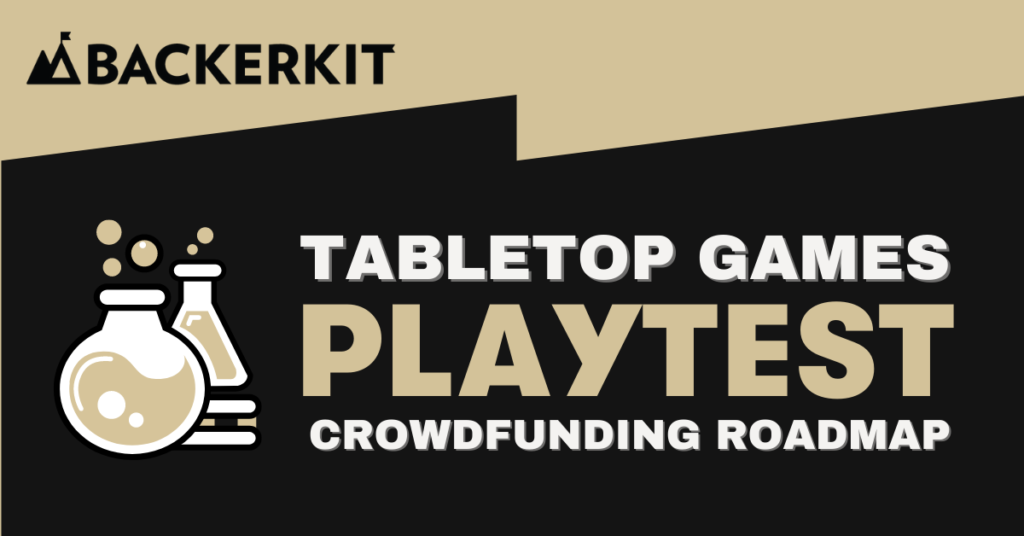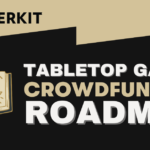
Now that you have a physical prototype and a digital prototype, it’s time to start playtesting for feedback.
By now, you should have defined your ideal backer and have crafted a working prototype in both physical and digital forms. While you may have played your game solo and/or with collaborators, it’s time to get it in the hands of others.
There are three main stages when you are playtesting your game — Internal Playtesting, Local Playtesting, and Blind Playtesting. They are all equally important when it comes to refining your game and getting it prepared for crowdfunding. Let’s briefly go over each stage.
Internal Playtesting is done solo, with your fellow designers and collaborators and your friends and family. Think of it as a way to ensure your game is functional and presentable before sharing it with a wider audience. During this stage, you are predominantly playing with people who will go easy on you, give mostly positive “got get ‘em” feedback, and will generally be rooting for your success. You are heavily involved in guiding people’s experiences, answering questions, and taking in feedback directly. You should play with as many people in your inner circle as possible until you are comfortable putting it in front of strangers. It’s important to temper your excitement in this stage and prepare yourself for a pretty heavy feedback cycle with the next two stages.
Local Playtesting is when things can get a little scary or frustrating for some. But fear not — this is all part of the process and is arguably the most important stepping stone on your path to getting your game made. This is when you are presenting and playing your game with people you don’t know. Strangers! This generally happens at events, organized meetups, and conventions. Ideally, you know what parts of your game you want feedback on, have a way to properly record your playtests, and are wide open for both positive and negative feedback. Again, you will be present to guide the experience and directly answer questions with your players. You don’t have to take every piece of feedback and advice to heart and make immediate changes. But you do have to have a system in place to record feedback, access feedback, and ultimately decide what feedback is worth acting upon and what is not. This will take a lot of practice and patience for sure, but it is worth it in the end. By the end of this stage, you should have an early version of your rulebook made, but nothing final until the end of the next stage.
Blind Playtesting is the ultimate test of strength, will, and patience. We’re being a bit dramatic, but this is a true test when you are not physically assisting during the game. Players are opening the box, and their only guide is your rulebook. If you are present, you are strictly an observer. You can’t clear up any confusion and can’t answer any questions in the moment. Players are relying solely on your game’s rule book as if they just purchased the game. Too often, people skip this stage because they fear they may not be as close to finishing as they thought. That’s ok. Observe how people play your game, take more notes, and have a solid plan for feedback when the session is over.
Here are a few key things to keep in mind while playtesting your game:
- Mentally, you need to be prepared to receive all forms of feedback, including the good, the bad, and the ugly. Some advice will drastically help shape your game, while some advice will make you feel like it’s all broken beyond repair. It’s your job to parse out the feedback and understand what needs to be implemented.
- Take notes, notes, notes, and more notes. This is how you will ultimately refine your game. You should be taking notes every chance you get.
- You should have a template for the kinds of feedback you want to get and keep it as consistent as possible to identify patterns.
- Consider how long your game takes to play. Running a game from beginning to end is not always the best idea. It may work for more casual games, but not heavy strategy games, for example. If your game has a playtime longer than an hour or so, think about playtesting parts of your game. Consider a truncated version that allows folks to give you necessary feedback and a sense of what an entire playthrough would feel like. You don’t have to solve all your problems at once. This is especially true for people at conventions that may only want to sample your game or only have 20 minutes or so to spare.
When are you done?
One of the hardest things you will have to do is decide when your game is complete, or at least complete enough to initiate a crowdfunding campaign. It’s totally fine to work on your game during and after your campaign, but what’s presented needs to reflect a game that is at least 85% complete.
Set some parameters for yourself that can help define when to stop playtesting and move on to the next stage. Technically you could refine and polish your game forever. It’s up to you to decide when enough is enough. Remember, it will never be the perfect game for everyone, but it should be a desirable and fun experience for your ideal backers.
Resources:
A digital simulator that allows players to create and playtest their tabletop in a multiplayer sandbox. This seems to be the digital standard these days and a good alternative to in-person events for the time being.
TabletopiaA digital simulator that allows players to create and playtest their tabletop in a multiplayer sandbox. This seems to be a good alternative to in-person events for the time being.
Creating a Playtest Feedback Form for Your Board GameLearn how to develop your playtesting strategy and how to get the most actionable feedback from your playtesters.
Webinar: Developing & Playtesting During the Pandemic w/ Jamey StegmaierGame designer Jamey Stegmaier from Stonemaier Games (Scythe, WIngspan) discusses the current state of the games industry, and shares best practices for those designing and playtesting games.
Board Game Design Lab Playtesting ResourcesA comprehensive list of playtesting resources from Board Game Design Lab
Playtest GroupsCardboard Edison has compiled a list of online and local playlets groups, along with their Discord or website links.
BackerKit Tabletop Game Night (San Francisco) *The in-person event is on pause through 2021
If you are in the San Francisco Bay Area, you should attend our monthly game night where game designers test their prototypes, network, and meet potential backers who are there just to play games and give feedback.
Now that you’ve playtested your game, you should create your final campaign-ready prototype.
Are You Ready to Launch?
Contact Us
Have feedback or something you'd like to see added to this roadmap?
Let us know at: [email protected]
Part of a community? Share this page!
